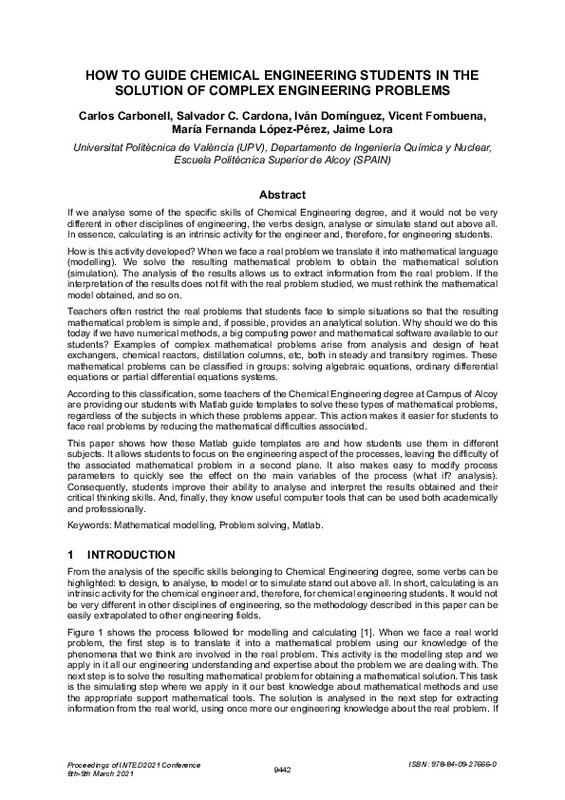JavaScript is disabled for your browser. Some features of this site may not work without it.
Buscar en RiuNet
Listar
Mi cuenta
Estadísticas
Ayuda RiuNet
Admin. UPV
HOW TO GUIDE CHEMICAL ENGINEERING STUDENTS IN THE SOLUTION OF COMPLEX ENGINEERING PROBLEMS
Mostrar el registro sencillo del ítem
Ficheros en el ítem
| dc.contributor.author | Carbonell Alcaina, Carlos
|
es_ES |
| dc.contributor.author | Cardona, S. C.
|
es_ES |
| dc.contributor.author | Domínguez-Candela, Iván
|
es_ES |
| dc.contributor.author | Fombuena, Vicent
|
es_ES |
| dc.contributor.author | López Pérez, Maria Fernanda
|
es_ES |
| dc.contributor.author | Lora-García, Jaime
|
es_ES |
| dc.date.accessioned | 2021-11-20T21:31:45Z | |
| dc.date.available | 2021-11-20T21:31:45Z | |
| dc.date.issued | 2021-03-09 | es_ES |
| dc.identifier.isbn | 978-84-09-27666-0 | es_ES |
| dc.identifier.issn | 2340-1079 | es_ES |
| dc.identifier.uri | http://hdl.handle.net/10251/177320 | |
| dc.description.abstract | [EN] If we analyse some of the specific skills of Chemical Engineering degree, and it would not be very different in other disciplines of engineering, the verbs design, analyse or simulate stand out above all. In essence, calculating is an intrinsic activity for the engineer and, therefore, for engineering students. How is this activity developed? When we face a real problem we translate it into mathematical language (modelling). We solve the resulting mathematical problem to obtain the mathematical solution (simulation). The analysis of the results allows us to extract information from the real problem. If the interpretation of the results does not fit with the real problem studied, we must rethink the mathematical model obtained, and so on. Teachers often restrict the real problems that students face to simple situations so that the resulting mathematical problem is simple and, if possible, provides an analytical solution. Why should we do this today if we have numerical methods, a big computing power and mathematical software available to our students? Examples of complex mathematical problems arise from analysis and design of heat exchangers, chemical reactors, distillation columns, etc, both in steady and transitory regimes. These mathematical problems can be classified in groups: solving algebraic equations, ordinary differential equations or partial differential equations systems. According to this classification, some teachers of the Chemical Engineering degree at Campus of Alcoy are providing our students with Matlab guide templates to solve these types of mathematical problems, regardless of the subjects in which these problems appear. This action makes it easier for students to face real problems by reducing the mathematical difficulties associated. This paper shows how these Matlab guide templates are and how students use them in different subjects. It allows students to focus on the engineering aspect of the processes, leaving the difficulty of the associated mathematical problem in a second plane. It also makes easy to modify process parameters to quickly see the effect on the main variables of the process (what if? analysis). Consequently, students improve their ability to analyse and interpret the results obtained and their critical thinking skills. And, finally, they know useful computer tools that can be used both academically and professionally | es_ES |
| dc.language | Inglés | es_ES |
| dc.publisher | IATED | es_ES |
| dc.relation.ispartof | INTED2021 Proceedings | es_ES |
| dc.rights | Reserva de todos los derechos | es_ES |
| dc.subject | Mathematical modelling | es_ES |
| dc.subject | Problem solving | es_ES |
| dc.subject | Matlab | es_ES |
| dc.subject.classification | INGENIERIA QUIMICA | es_ES |
| dc.title | HOW TO GUIDE CHEMICAL ENGINEERING STUDENTS IN THE SOLUTION OF COMPLEX ENGINEERING PROBLEMS | es_ES |
| dc.type | Comunicación en congreso | es_ES |
| dc.type | Artículo | es_ES |
| dc.type | Capítulo de libro | es_ES |
| dc.identifier.doi | 10.21125/inted.2021.1977 | es_ES |
| dc.rights.accessRights | Abierto | es_ES |
| dc.contributor.affiliation | Universitat Politècnica de València. Departamento de Ingeniería Química y Nuclear - Departament d'Enginyeria Química i Nuclear | es_ES |
| dc.description.bibliographicCitation | Carbonell Alcaina, C.; Cardona, SC.; Domínguez-Candela, I.; Fombuena, V.; López Pérez, MF.; Lora-García, J. (2021). HOW TO GUIDE CHEMICAL ENGINEERING STUDENTS IN THE SOLUTION OF COMPLEX ENGINEERING PROBLEMS. IATED. 9442-9450. https://doi.org/10.21125/inted.2021.1977 | es_ES |
| dc.description.accrualMethod | S | es_ES |
| dc.relation.conferencename | 15th International Technology, Education and Development Conference (INTED 2021) | es_ES |
| dc.relation.conferencedate | Marzo 08-09,2021 | es_ES |
| dc.relation.conferenceplace | Online | es_ES |
| dc.relation.publisherversion | https://doi.org/10.21125/inted.2021.1977 | es_ES |
| dc.description.upvformatpinicio | 9442 | es_ES |
| dc.description.upvformatpfin | 9450 | es_ES |
| dc.type.version | info:eu-repo/semantics/publishedVersion | es_ES |
| dc.relation.pasarela | S\431150 | es_ES |








